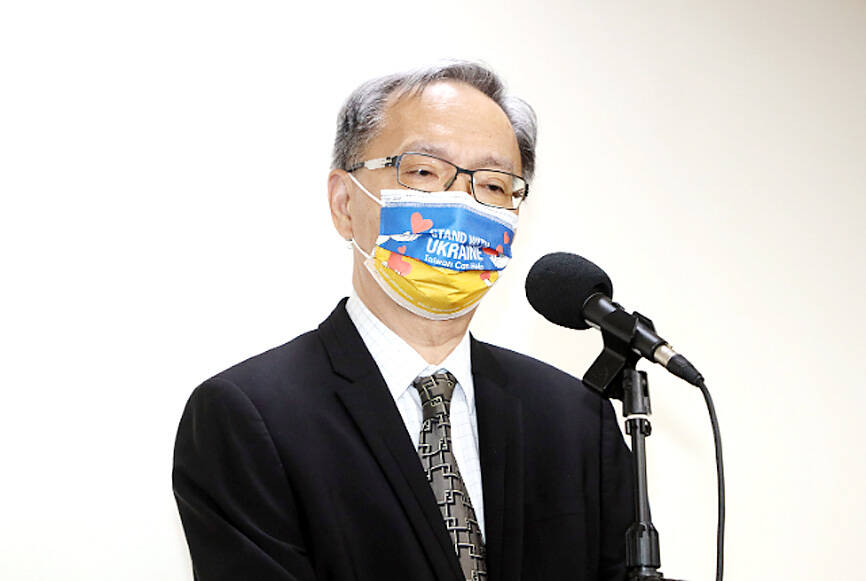Any move toward legalizing assisted suicide in the nation should be made with caution and start from the grassroots, as it would be “improper” for the government to take the lead on the policy, Minister of Health and Welfare Hsueh Jui-yuan (薛瑞元) said yesterday.
Hsueh made the remarks at a meeting in the Legislative Yuan, where he took several questions relating to famed sculptor Ju Ming (朱銘), who died by suicide at 85 over the weekend following years of chronic health problems.
Chinese Nationalist Party (KMT) Legislator Wen Yu-hsia (溫玉霞) said that Ju’s death and dozens of similar cases each year highlighted areas of Taiwan’s “long-term care” policies that still needed to be improved.

Photo: CNA
In making those reforms, the government should also consider the question of whether to legalize euthanasia, Wen said, but added that it would probably be difficult to reach a consensus at present.
New Power Party Legislator Chiu Hsien-chih (邱顯智) asked to what degree such issues could be handled under current laws, such as the Hospice Palliative Care Act (安寧緩和醫療條例) of 2000 and the 2019 Patient Right to Autonomy Act (病人自主權利法), which guarantees patients’ right to a good death.
Citing the Netherlands as an example of a country that has legalized euthanasia while maintaining “extremely rigorous standards,” Chiu asked whether the health ministry should initiate conversations with various sectors of society on the topic.
Hsueh said that with euthanasia, the crux of the issue is that it does not just involve a person who is ill and wants to end their life, but also another individual who has to actively assist them.
As this responsibility would currently fall on medical personnel, there is significant controversy over whether it should be allowed, he said.
Many cases, like Ju’s, have complex backstories, and should not be automatically attributed to failures in long-term care policies, he said.
As for the legal and ethical side of the issue, the laws cited by Chiu are sufficient at least for passive situations, in which doctors do not provide life-extending care if that is what the patient wants, he said.
However, in terms of physician-assisted suicide, the problem is that both the Hippocratic Oath and the policies of the World Medical Association are firmly opposed to it, Hsueh said.
Therefore, even if there were a legal basis for euthanasia, there might not be medical professionals willing to take part, he said.
Hsueh also appeared wary of engaging with medical associations on the issue, saying it would be “a bit strange” for the health ministry to be in the position of trying to convince doctors to breach their own professional guidelines.
Because of this, Hsueh said he believes that any plans to change the legal status of euthanasia should be made with caution, and should proceed from the bottom up.
“The government should not be enthusiastically promoting euthanasia. Having the government take the lead [on the issue] would be improper,” Hsueh added.

An essay competition jointly organized by a local writing society and a publisher affiliated with the Chinese Communist Party (CCP) might have contravened the Act Governing Relations Between the People of the Taiwan Area and the Mainland Area (臺灣地區與大陸地區人民關係條例), the Mainland Affairs Council (MAC) said on Thursday. “In this case, the partner organization is clearly an agency under the CCP’s Fujian Provincial Committee,” MAC Deputy Minister and spokesperson Liang Wen-chieh (梁文傑) said at a news briefing in Taipei. “It also involves bringing Taiwanese students to China with all-expenses-paid arrangements to attend award ceremonies and camps,” Liang said. Those two “characteristics” are typically sufficient

A magnitude 5.9 earthquake that struck about 33km off the coast of Hualien City was the "main shock" in a series of quakes in the area, with aftershocks expected over the next three days, the Central Weather Administration (CWA) said yesterday. Prior to the magnitude 5.9 quake shaking most of Taiwan at 6:53pm yesterday, six other earthquakes stronger than a magnitude of 4, starting with a magnitude 5.5 quake at 6:09pm, occurred in the area. CWA Seismological Center Director Wu Chien-fu (吳健富) confirmed that the quakes were all part of the same series and that the magnitude 5.5 temblor was

The brilliant blue waters, thick foliage and bucolic atmosphere on this seemingly idyllic archipelago deep in the Pacific Ocean belie the key role it now plays in a titanic geopolitical struggle. Palau is again on the front line as China, and the US and its allies prepare their forces in an intensifying contest for control over the Asia-Pacific region. The democratic nation of just 17,000 people hosts US-controlled airstrips and soon-to-be-completed radar installations that the US military describes as “critical” to monitoring vast swathes of water and airspace. It is also a key piece of the second island chain, a string of

The Central Weather Administration has issued a heat alert for southeastern Taiwan, warning of temperatures as high as 36°C today, while alerting some coastal areas of strong winds later in the day. Kaohsiung’s Neimen District (內門) and Pingtung County’s Neipu Township (內埔) are under an orange heat alert, which warns of temperatures as high as 36°C for three consecutive days, the CWA said, citing southwest winds. The heat would also extend to Tainan’s Nansi (楠西) and Yujing (玉井) districts, as well as Pingtung’s Gaoshu (高樹), Yanpu (鹽埔) and Majia (瑪家) townships, it said, forecasting highs of up to 36°C in those areas